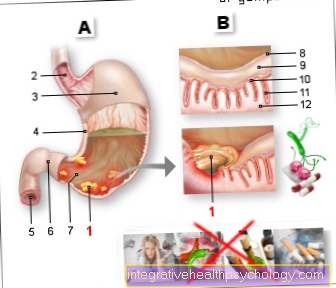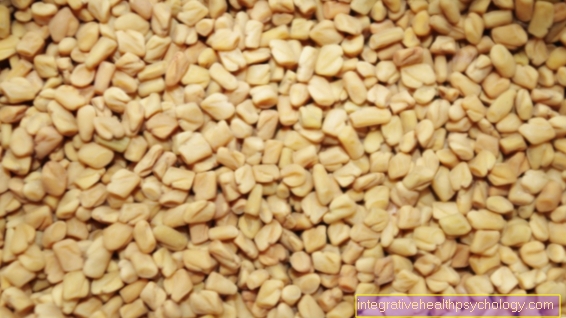How long does bronchitis last?
introduction
Bronchitis is an inflammation of the lower airways.
The duration of bronchitis depends largely on whether it is acute or chronic, although an acute course should last for several weeks, but should subside symptomatically after one to two weeks.

Duration of complaints
The duration of symptoms of bronchitis depends on whether it is an acute or chronic form of bronchitis. While the acute and often purulent form is triggered by pathogens such as viruses or bacteria, chronic bronchitis is based on chronic inflammation of the lower respiratory tract as a result of permanent damage to the lung tissue and the body's own lung cleansing system.
Due to the different causes of the two clinical pictures, the duration of the symptoms is also different. Acute bronchitis usually lasts about two weeks, the cough can be a bit protracted and last up to 4 - 6 weeks. By contrast, a definition by the WHO stipulates that chronic bronchitis is present if the patient has had a productive cough for at least 3 months within two years.
This could also be of interest to you: Cough remover
Duration of purulent / acute bronchitis
The duration of acute bronchitis is usually around two weeks in an uncomplicated case. The incubation time, i.e. the time between infection with the relevant pathogen and the actual appearance of the first symptoms of the disease, is usually 2-7 days in the case of a viral cause and is independent of the duration of the disease mentioned above or is not counted.
It also plays a role whether the pathogens are viruses (viral bronchitis), as in most cases, or whether there is an additional infection with bacteria (so-called superinfection) in the course of the disease.
Furthermore, the duration of acute bronchitis depends on additional circumstances such as the general state of health of the person affected, the nutritional status, amount consumed and diet, the age of the patient, the presence of other illnesses or an immune deficiency and behavior during the illness phase. This means that it can have an influence on the course of the disease whether you take physical care in the acute phase of the illness and take something back at work or whether you are physically vigorous and exposed to a lot of stress. In this case, stress can put additional strain on the immune system.
also read: Mucous bronchi
Duration of chronic bronchitis
As with all chronic illnesses, the word "chronic" also indicates that it is a slowly progressing and prolonged illness process. It is difficult to make a general statement about the duration of chronic diseases, as the course depends very much on the individual affected.
General physical condition, age, any immunodeficiency or concomitant diseases and, in the case of chronic bronchitis, possibly a chronic obstructive pulmonary disease (COPD), eating and drinking habits, care status / care situation and lifestyle all play a major role in the course of chronic bronchitis.
It also depends on the stage of chronic bronchitis. If it is a simple chronic bronchitis, it can heal without consequences after a few months. If, however, it is an advanced and / or obstructive form, it is possible that the bronchitis no longer heals and thereafter it is only possible therapeutically to prevent the disease process from advancing.
Find out more at: Chronic bronchitis - What to watch out for
How long will you be on sick leave with bronchitis?
The doctor decides individually on the basis of the available findings and the results of the physical examination carried out by the doctor whether a sick note is necessary and for how long it should be issued. Often those affected are first written off sick for a few days. If necessary, the certificate of incapacity for work can be extended after a medical consultation and a new physical examination.
When can I go back to exercise if I have bronchitis?
In the acute phase of illness, physical activity should be avoided if possible and the body should be given rest so that it can recover. If the person concerned feels fit enough, a relaxed walk, for example, is definitely possible.
However, if the symptoms are more severe, such as fever, exercise should be avoided. As a rule, bronchitis is over after about two weeks and when all symptoms have subsided, training can be resumed.
Also read our topic: Exercise for a cold
Duration of antibiotic use for bronchitis
Depending on the selected antibiotic, the preparation should usually be taken over a period of five to seven days, or the pack should always be used up completely. Because if you stop taking the antibiotic prematurely because of an improvement in the symptoms, antibiotic-resistant bacteria can develop.
It is important that the medication is taken regularly, in sufficient doses and with plenty of water during this period.
Find out more at: Which antibiotics help with bronchitis?
How long are you contagious?
The risk of infection with acute bronchitis is greatest in the first few days when the symptoms of the disease are particularly strong. However, it can also be assumed that there is a risk of infection while mucus is being produced and coughed up.
Some scientists also suspect that those affected can be contagious a day or two before the first symptoms appear. However, bronchitis is usually over within two weeks and by then at the latest the risk of infection is averted.
also read: How contagious is bronchitis?
Duration of the incubation period
The incubation time describes the period between infection with a pathogen and the actual appearance of the first symptoms of the disease and is approximately 2 to 7 days in the case of acute bronchitis caused by viruses.
The incubation time for bacteria depends on the individual bacterial strain and can be one to several days in the case of pneumococci, but also ten to twenty days in the case of mycoplasma.
Recommendations from the editorial team
- Causes of Bronchitis
- Symptoms of bronchitis
- Homeopathy for bronchitis
- COPD
- to cough





























